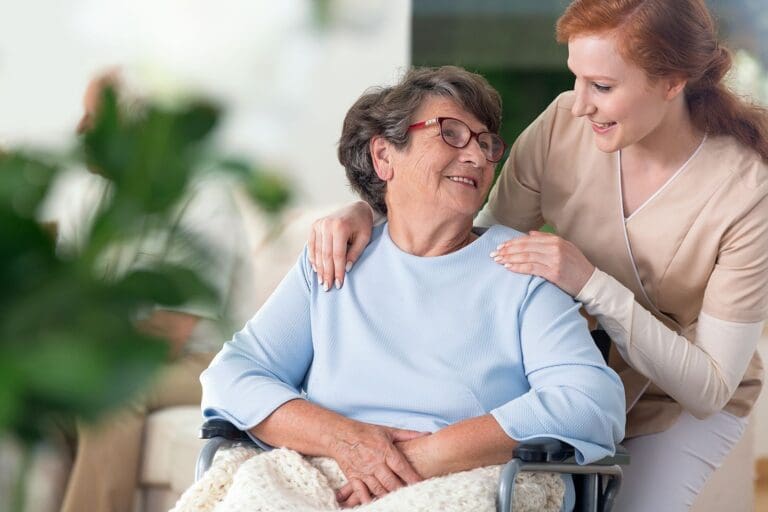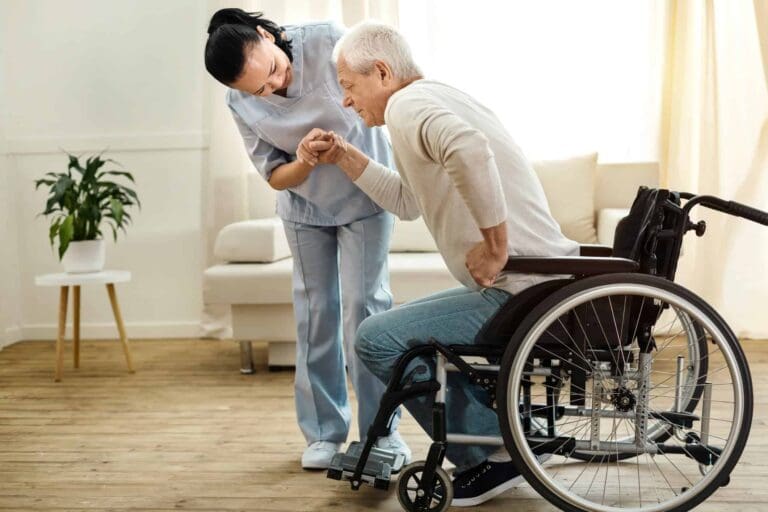Independent Mobility

Independent Mobility
Ruby – Rosie’s Mom
Loss of mobility in seniors can occur due to natural aging processes like collagen breakdown, leading to joint stiffness, and conditions such as hypertension, diabetes, Parkinsons and heart diseases.
My home, once filled with the laughter of family gatherings, had quietly transformed into a sanctuary of care for Mom. It was a shift, marked by the exchange of independence for a delicate dance of support and care.
“Let me help you with that,” I’d often say, watching Mom’s hesitant movements, trying to strike that balance between assistance and allowing her the dignity of independence.
“No, dear, I’ve got this,” Mom would respond, a faint glimmer of her former self-assurance in her voice, despite the frailty that had crept into her once-strong frame.
After my dad passed away and my mom moved back in with me, it became very difficult to take care of her. My mom was unable to move without assistance. She needed help to get up from a sitting position most of the time.
Occasionally she would surprise us by getting up on her own when no one was looking. She could not call out for help because her vocal cords had been affected by Parkinson’s resulting in such a soft speech that one could barely hear her event sitting next to her.
We installed an alarm system that would buzz anytime she would get out of bed or when her feet would touch the floor. We also had a little buzzer around her neck that she just had to press to sound an alarm so that someone in the house could go to her aid immediately. All that worked for a while, but it wore down the entire family, as the alarm sounds were loud and obnoxious.
Eventually we decided to get rid of that method and installed a Nest monitor which sent a text message anytime there was motion or noise detected in parts of the house that mom would normally be in: her bedroom, bathroom, and family room.
Then came that day, the doorbell’s ring stirring something in Mom. “I’ll get it,” she murmured, a trace of her old independence sparking to life. She attempted the journey from her bed to the door, a testament to her enduring spirit.
I was upstairs, unaware of her intentions, until my phone buzzed with an alert: “Motion detected in the living room.” My heart raced as I hurried downstairs, fearing what I might find.
And there she was, Mom, fallen just short of the door, her brief quest for independence ending on the floor. I rushed to her side, my heart aching as I gently cradled her, whispering, “I’m here, Mom. “
Witnessing her fall and big bruise on her hip and arm, I decided we had no choice left but to get round-the-clock care.
From alarms and cameras to securing a full-time caregiver, each adaptation to Mom’s diminishing mobility was not just about enhancing care but also preserving her dignity in our new normal, acknowledging the poignant mix of loss and resilience it brought.

The Sudden Shift
Susan, Wyatt, and Harriet’s Story
Susan glanced at her phone and sighed, seeing another missed call from the hospital. Her mother, Harriet, had been discharged after a short stay due to a fall, and now Susan was juggling work, kids, and caring for Harriet. The stress was palpable, a constant undercurrent in their lives.
“Susan, your mom needs you,” Wyatt said gently, noticing her anxiety. “Let’s figure out how to manage this.”
“I know, Wyatt. But she’s so stubborn. She refuses help,” Susan replied, her voice tinged with frustration. “Every time I suggest something, she insists she can handle it.”
After Harriet’s fall, Susan and Wyatt had set up a monitoring system to ensure they could keep an eye on her movements. Despite the added security, Harriet resisted any changes to her routine, wanting to prove she could still manage on her own.
One afternoon, while Susan was deep into a work project, her phone buzzed with an urgent notification: “Alert: Fall detected.” Panic surged through her as she grabbed her keys and rushed home, her mind racing with fear of what she might find.
When she arrived, she found Harriet on the kitchen floor, trying to pull herself up. The sight of her mother, vulnerable and in pain, broke her heart. “Mom, are you okay?” she asked, kneeling beside her.
Harriet’s eyes were filled with tears of frustration and helplessness. “I just wanted to make some tea. I didn’t mean to cause all this fuss.”
Susan gently helped her mother to a chair. “Mom, we need to talk about getting some help. This can’t go on. It’s not safe for you to be alone like this.”
Harriet shook her head, her pride wounded. “I don’t want strangers in my home. I can manage.”
“No, Mom, you can’t,” Susan said firmly, trying to keep her emotions in check. “We need to think about your safety. We can’t always be here, and we need to know you’re okay.”
That evening, Susan and Wyatt sat down with Harriet to discuss their concerns. The atmosphere was tense, but they knew this conversation was necessary. “Mom, we’ve been thinking about getting a caregiver to help you with daily tasks,” Susan began, trying to soften the blow. “Someone who can be here when we can’t.”
Harriet’s face crumpled as she fought back tears. ” I don’t want to depend on someone else.”
Wyatt chimed in, his voice gentle yet persuasive. “It’s not about that, Harriet. It’s about making sure you’re safe and comfortable. We want you to be happy and healthy.”
After a long, emotional discussion, Harriet finally nodded, her resistance waning. “I know you’re right. It’s just hard to accept that I need help.”
Susan hugged her tightly, tears streaming down her face. “We’ll get through this together, Mom. We love you and want the best for you.”
In the weeks that followed, they hired a kind, compassionate caregiver who quickly became part of their extended family. The transition wasn’t easy, but it brought peace of mind to Susan and Wyatt, knowing Harriet was in good hands.
Through each adjustment, they focused on preserving Harriet’s dignity and independence as much as possible. It was a journey marked by love and resilience, as they adapted to this new chapter in their lives, cherishing every moment they had together.

The Unwanted Change
Peter, Velma, and Irwin’s Story
Peter sat in the car, gripping the steering wheel tightly. He had just left a meeting with his father’s doctor, who had recommended that Irwin stop driving after a minor car accident. The news hit Peter hard, knowing how much his father valued his freedom and independence.
“How are we going to tell him?” Peter asked, turning to Velma. “He’s going to be devastated.”
Velma sighed, feeling the weight of the situation. “We’ll have to be gentle but firm. It’s about his safety and everyone else’s.”
When they arrived at Irwin’s place, Peter took a deep breath and walked inside, ready to face the difficult conversation. He found Irwin in the living room, reading the newspaper, blissfully unaware of the discussion about to unfold.
“Dad, we need to talk,” Peter began, trying to keep his voice steady. “The doctor says it’s time to stop driving.”
Irwin looked up, his face a mix of confusion and anger. “What? Why? I’ve been driving my whole life. I don’t need anyone telling me what to do.”
Peter sat down across from him, feeling a knot in his stomach. “Dad, you had an accident. It wasn’t serious, but it could have been. It’s not safe anymore. We can’t risk it happening again.”
Irwin’s eyes flashed with defiance. “I can still drive. That accident was just a fluke. I’m not giving up my keys.”
Velma stepped in, her voice calm but firm. “Irwin, we’re worried about you. We can’t risk another accident. We need to find a safer solution.”
Irwin stood up, his hands shaking with frustration. “I’m not ready to give up. What am I supposed to do, rely on you two for everything?”
Peter felt his own frustration rising. “Dad, we’re not saying you’re helpless. We just want to make sure you’re safe. We can find other ways to get you around.”
After a long, tense silence, Irwin finally sat back down, defeated. “Fine. But I don’t like it. Not one bit.”
Peter put a hand on his father’s shoulder. “We know, Dad. We’ll make this work, together. We’ll find new routines and keep you active.”
In the days that followed, they arranged for a driver and started exploring new activities Irwin could enjoy. It wasn’t easy, and there were many moments of tension and frustration, but they were committed to ensuring his safety and well-being.
Peter and Velma worked tirelessly to find solutions that respected Irwin’s dignity while keeping him safe. They researched local services, connected with support groups, and even found a community center where Irwin could engage in activities he loved.
Gradually, Irwin adjusted to the changes. He began to appreciate the new routine, even enjoying the company of his driver, who shared similar interests. The frustration gave way to acceptance, and Irwin found himself feeling less burdened by the limitations age had imposed on him.
One sunny afternoon, as Peter and Irwin walked through the park, Irwin turned to his son. “You know, this isn’t so bad after all. I miss driving, but I’m glad I’m still able to get out and do things.”
Peter smiled, relief washing over him. “We just want you to be happy and safe, Dad. That’s all that matters.”
In the end, it was about navigating the delicate line between independence and care, driven by love and respect. Peter and Velma learned to adapt, embracing the challenges and finding strength in their commitment to support Irwin through this difficult transition. Together, they faced each obstacle with compassion, forging a path that honored Irwin’s spirit while ensuring his well-being.


